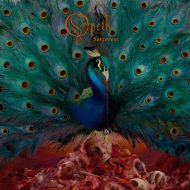 Here’s a band which needs no introduction. Suffice to say that this is their twelfth album, and it was recorded in Wales. Mr Åkerfeldt seems pretty happy with it, describing it as “fresh and old, both progressive and rehashed, heavy and calm”.
Here’s a band which needs no introduction. Suffice to say that this is their twelfth album, and it was recorded in Wales. Mr Åkerfeldt seems pretty happy with it, describing it as “fresh and old, both progressive and rehashed, heavy and calm”.
What is not here at any point is the old progressive death style of “Blackwater Park” and the like. Mr Åkerfeldt and his team have branched out, often reaching into a retro type sound with a 70s style electric organ popping in. But that alone is an unfair summary. Musically, technically and stylistically a few old friends make an appearance while there are many new ones too. The careful and imaginative structure of the songs and sound effects are delivered in a sensitive way, which maximises the impact of these varied songs. The opener is the short “Persephone”, an acoustic Hispanic-style delicacy. It reminded me a little of “July Afternoon 2005” by April Ethereal, the band’s name itself of course being that of an Opeth track. It has a shadowy side, a quality it shares with the title track which follows. But this time Mr Åkerfeldt shows he has moved on in scope and widened his sphere of interest by calling upon the medium of repressed retro electro prog jazz. There are clear signals of intent. The beat is powerful and militaristic. It’s dark and once again shadowy. This is the fresh and old side. There’s “Damnation” style delicacy – this is a recurrent feature of this album. The song “Sorceress” is really interesting, thought provoking and quirky. It ends in a grandiose fashion.
This album is mostly mellow but this is Opeth, and through delicacy of touch and subtlety of shade every ounce of atmosphere is created. “Will o the Wisp” is a delightful acoustic track, perfectly crafted, and replete with subtle sound effects and lingering tones. So too “Sorceress 2” is another quiet, sensitive “Damnation” type song with a spooky edge. “Chrysalis” by contrast is a bit heavier and a rock n roll type song, blending into a typically reflective passage. One of my favourite tracks was the multi-coloured “The Wilde Flowers”. The lyrics are dark, the style is jazzy and there are those strong old style organ touches. This song is separated into distinct phases. Delightful and playful to begin with, the song develops and expands progressively. It’s colourful and imaginative. A quiet and moody passage follows before a short reverberating passage closes the song, which is full of life.
After “Sorceress 2” comes “The Seventh Sojourn, another quiet “Damnation” type song but with a kind of eastern mysticism to begin. After four minutes, the mood changes and there is a haunting and light chorus and piano tones suggestive of leaves falling from trees. By this stage, the album is slowing down into a melancholy, trance-like state. “Strange Brew” starts dreamily and delicately, but then burst out into a jazz prog swirl not unlike Haken. What follows is like crusty 70s rock, but of all the tracks so far, this one transforms its atmosphere and swings the most between soft and hard canvases, and but always creates haunting melancholy. Mr Åkerfeldt’s vocals never dominate, but support the impactful sound effects and bewitchingly delicate prog movements. Such is “A Fleeting Glance”. The blend of sound enhances the song’s atmosphere with its heartbeat, harmonies, soft prog and emotional lushness. After largely acoustically- and sonically-driven atmospheres, “Era” comes in with measured urgency. What is noteworthy about it and what has gone before is that its structure, whilst rock-based, is unusual and even disarming. We were now near the end, and it was nice that the album closes with the acoustic tones it started with, and brings us softly and appropriately back down to earth.
“Sorceress” is more experimental than I previously associated with Opeth. The soft prog and jazz influences are there but this album distinguishes itself for its subtleties as it creates delicate and gloomy moods in an imaginative way. It may be Opeth’s twelfth album, and some may not like the musical direction they have taken in recent years, but the ideas behind their musical creations are evidently still abundant.
(9/10 Andrew Doherty)

Leave a Reply